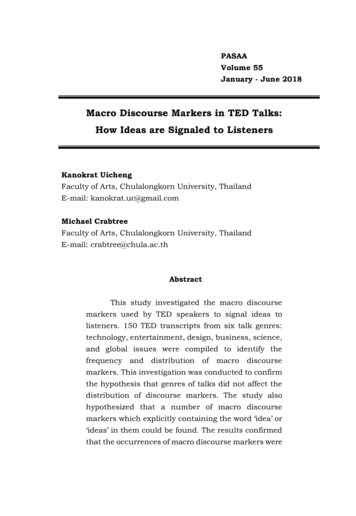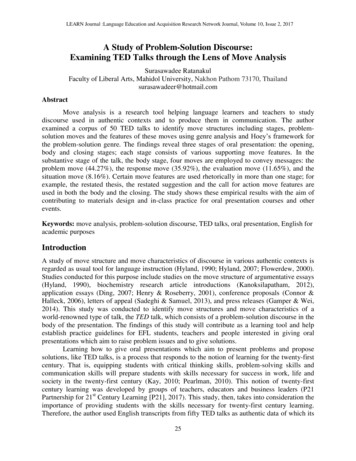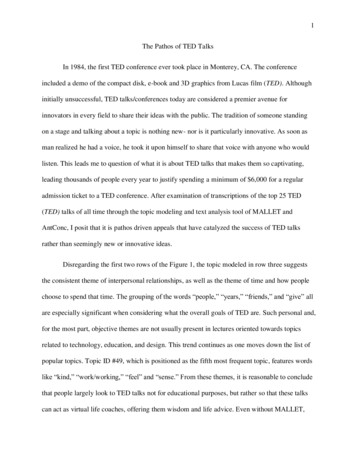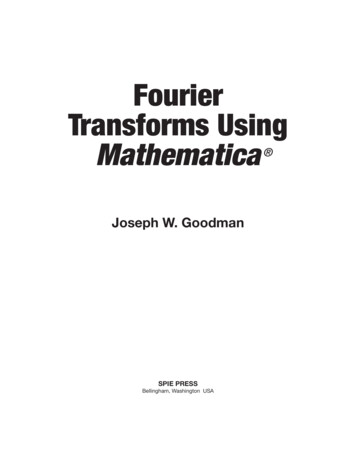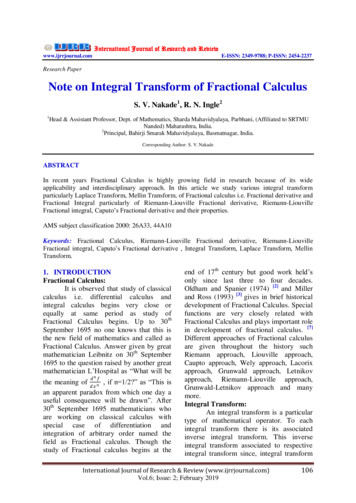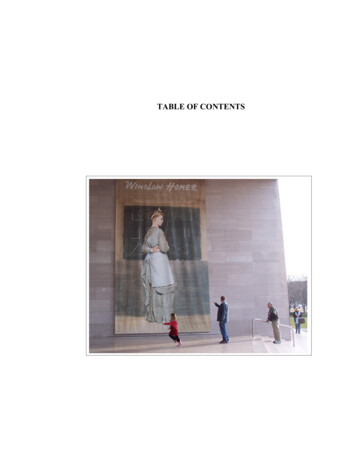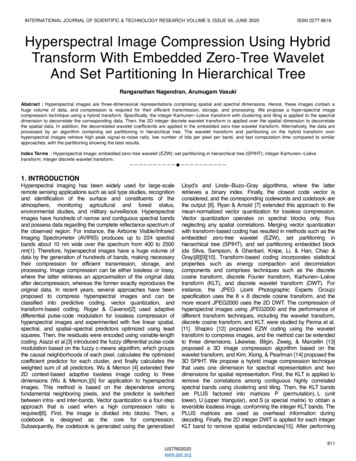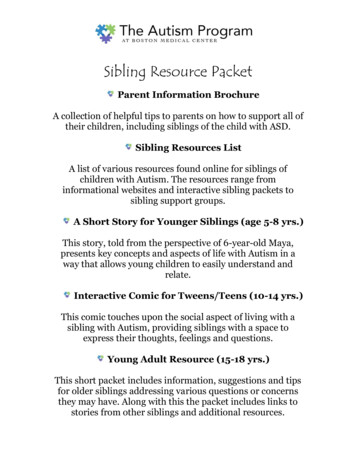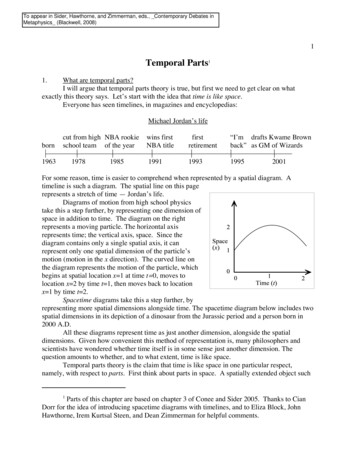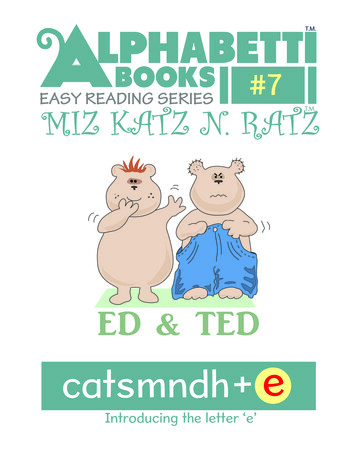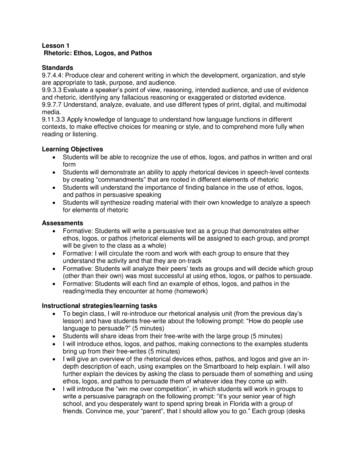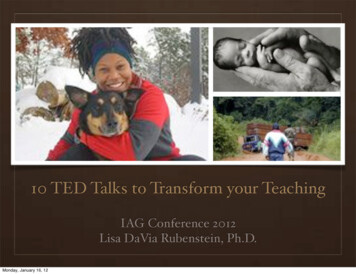
Transcription
10 TED Talks to Transform your TeachingIAG Conference 2012Lisa DaVia Rubenstein, Ph.D.Monday, January 16, 12
What makes an ideaworth spreading?Monday, January 16, 12
What makes an ideaworth spreading?Are we spreading those ideas in our classrooms?Monday, January 16, 12
The Importance ofKnowledge?!The concept of going to school for knowledge is kind ofquaint.!65% of preschoolers will have jobs that do not exist today.!50% of material learned in the first year of a college sciencedegree will be obsolete by the time the students graduate.Jim CarrollMonday, January 16, 12
Curriculum Evaluation!Honorable: Is it worth their time? Could they easily lookup the information? Does it honor the world we live in andthe students we teach?!Transferrable: Is it teaching a thought process? Could thisidea be adjusted to apply in other areas? Are we explicitlyteaching this transfer?!Transformational: Will it change the world? Will itchange the students’ perspective?!Beneficial: Will it make the world better? Is it useful?!Exciting: Does it engage the students? Does it inspirestudents to think about how they want to use their talents?Monday, January 16, 12
Disclaimer: Please READ OR WATCH all talks before showing your class!Monday, January 16, 12
Monday, January 16, 12
Teaching this lesson allowed me to experience the power of a TED Talk.Ihave students who went home and looked up TED Talks about topics they wereinterested in, and I had one student bring headphones to school so he could watchone about his modern explorer during in-class research time. Considering that Idid not give students much background information about TED Talks and I didnot actually encourage them to check them out on their own (which maybe Ishould have!), I have been amazed at the positive response students have shown. Iwas excited when I learned that my students were actually pursuing TED Talksoutside of class! Originally, I was concerned that TED Talks might be tooadvanced for my 5th grade class. However, my students enjoyed it, and theyunderstood most of it. Now, I am exploring the TED Talk website to find othertalks that relate to topics we study so that I can include them in more lessons inthe future.Monday, January 16, 12
AgendaCreative ProblemSolvingFuture CareerGoals and nectionsSocraticSeminarsTransform your CraftMonday, January 16, 12
Transform your Craft!Track educational movements!Understand advances in various disciplines!Study the process of deliberate communication!Appreciate who you are teachingMonday, January 16, 12
Sir Ken RobinsonTransform your CraftMonday, January 16, 12
Sugata MitraTransform your CraftMonday, January 16, 12
Growing as a Presenter!"# %&'(! "# %&'()*&' %! ,-*. /*&' %! 012&'()*&' %345'6%'()*%) 7! 8 %2 91 %) 23 :3"%*)&' %)#%* ,#-(! ; (%'&' %! ,-*. /*&' %! & %&'*! 22'.- ! "%2&/1)&' %2! /2 %*-3 2 %2'.'-'&?Monday, January 16, 12.#''*-,/0 ,#-12&0-(!,@*A - 2! /2 %*-35& /' 2! /&/*'&23 :3B&C /2!D1-&' - 38 %& @&2!E%121*-38 %% )&' %2!F%*- 6' 2!5C*/ #3,@ /' %) 2!81// %&3,G %&2!;*&*3 / 2 %&*&' %!,@)'& A %&H *22' %
InterdisciplinaryConnections !"# %&'&%( )*%&' %&* ,-)# & ./01,- 2-3#1#' %45-"#6#67#"-89# -5-:&";%- * # %#2-;*6#%9& .-/"*6-; &# #- 2-1&%#" %0"#- 2 ;( 9*1*.( -5%-8 ;-;*-#? &%& .@-5-8 ;-;*-#? &%#2-7# 0;#-5-8 ;-;##& .-;*6#%9& .,9*8-%9& .;-8#"#-8*"A& .-& -%9#-8*"12,- 2-5-8 ; B%-C0;%-1**A& .-/*"- -%#;% DE EEE!*11#.#-F"#;96 -G* *";-H%02# %IJ0%9# %& -KL"# "#;-%9#6-/*"-%9#-8*"12 MI!*660 & %&* - 2-!*11 7*" %&* Monday, January 16, 12
Eric WhitacreInterdisciplinary ConnectionsMonday, January 16, 12
Transferrable , January 16, TechnologyTyrannyVarianceWealth
Chimamanda AdichieInterdisciplinary ConnectionsMonday, January 16, 12
Jacek UtkoInterdisciplinary ConnectionsMonday, January 16, 12
Possible Student Projects Ideas: Identify the interdisciplinary concepts in this talk. You may use theTransferrable Concepts List to help guide your thinking. Then give several examplesof this concept in two other disciplines. Solutions: What other fields would benefit from his/her ideas? How might the ideasbe adjusted to improve this other discipline? Find someone in another field thatwould benefit, and construct a letter informing him/her how this idea might benefithis/her work. Pretend you watched this talk with (famous person from your currentunit of study) and (famous person from another field). What doyou think they would talk about after the talk? No ideas are born in a vacuum. What do you think inspired this person? What otherideas from other fields added to this person’s new idea?Monday, January 16, 12
Creative Problem SolvingIdentify the goal,wish, or challenge.Clarify theproblem.Gather data.Generate ideas.Select/strengthensolutions.Plan for action.Miller, Vehar, & Firestein, 2001Monday, January 16, 12
But why?!Applicable for any field!Provides structure and reliability for creativity!Solves problems“This is honestly the most exciting period for the study of unknown life forms onour planet. The dominant things that exist here we know almost nothing about.”Nathan WolfeMonday, January 16, 12
Nathan WolfeCreative Problem SolvingMonday, January 16, 12
Creative Problem SolvingBill GatesStudentsSpeakersNathan WolfeEd UlbrichMonday, January 16, 12
Student ProjectsSpeaker CPSEvaluate how the speaker solves the problem. What steps does he/she take? Wouldyou have done it any differently? Was it effective? Why?Missing steps: What steps did the speaker neglect? Why do you think they were leftout? Write a letter to the speaker to ask for further clarification on their problemsolving experiences.Student CPSUsing the CPS framework, create another possible solution for the presentedproblem. Create a presentation for the building acceptance portion.Inevitably solving one problem brings to light several others. Examine potentialproblems that the speakers’ solution will trigger. Using the CPS framework,think though several possible solutions to this new problem.Monday, January 16, 12
Socratic , January 16, 12
Socratic l Paideia CenterMonday, January 16, 12
Lucianne WalkowiczSocratic SeminarMonday, January 16, 12
Generic Outline for a SeminarPre-SeminarContent: What is the relevant information? (You may want to give the students anopportunity to think about this at home or overnight.)Process: What should we work on as a group and as individuals to make this a goodseminar?SeminarOpening: What is the speakers’ purpose? What would be a good title for this talk? (Makesure the students are supporting their answers.) What is the speaker’s passion? What isthe most important idea?Core: What is meant by ? Is this the appropriate solution? What is the differencebetween this speakers’ approach and ? How do you think this speech would beviewed by ? Did the speaker support his or her ideas? Is any of the informationmisleading? What further experiments might be completed to support this perspective?Closing: What does this speech teach us about ? How do these ideas relate to ourcurriculum? What are the barriers to the implementation of this solution or idea? Whyis this important? What are other related questions? What did you learn from theother participants? Do you have any ideas for improving the speaker’s ideas?Post-SeminarProcess: What did we do well during our discussion?Content: What are your new ideas?Monday, January 16, 12
Social ResponsibilitynaeOcsEducationFoodFilmMusicWishes big enough to change the world.Monday, January 16, 12
Sylvia EarleTED PrizeMonday, January 16, 12
Paul NicklenEnvironmental ResponsibilityMonday, January 16, 12
Possible ProjectsApply for the TED Prize. Write a speech that clearlydelineates how you would use the money ( 100,000) andthe publicity to change the world. Use the nominationcriteria to construct a meaningful proposal.Evaluate three of the past winners. Why did their ideaswin? What makes them significant? Evaluate theirprogress. If you were the head of a funding agency,which program would your continue to fund and why?How can you get involved with one of the recent TEDwinners? How can you use your strengths to help theirwish come true?Monday, January 16, 12
Future Careers and Role Models!Broadened conception of opportunities!Multicultural representation!Some realism mixed with optimism!A beginning!A connectionMonday, January 16, 12
Majora CarterA Socially Responsible Role ModelMonday, January 16, 12
Possible ProjectsJournals: How are you like the speaker? How are youdifferent? Have you ever thought about doing somethingin that specific field? How could you contribute? Whatideas to you have? About what questions do you wonder?What do you admire about the speaker?Research other people who work on that problem. Whatcharacteristics do they have in common? How are theydifferent?Create an interview protocol. What would you like to knowabout this person and what he/she does? Look online tosee if you can find answers to your questions, and emailthe person the questions you can not find answers to.Monday, January 16, 12
Creative ProblemSolvingFuture CareerGoals and nectionsSocraticSeminarsTransform your CraftMonday, January 16, 12
My WishI wish teachers took the time to explore new ideas andthoughts that interested them.I wish that students had the opportunity to learn about theamazing breakthroughs that are taking place all over theworld in every discipline as a part of their education.Selfishly, I wish that if my first two wishes come true, thatthese teachers and students will share their adventureswith me.Monday, January 16, 12
Thank you.lmrubenstein@bsu.eduMonday, January 16, 12
was excited when I learned that my students were actually pursuing TED Talks outside of class! Originally, I was concerned that TED Talks might be too advanced for my 5th grade class. However, my students enjoyed it, and they understood most of it. Now, I am exploring the TED Talk website to find other
